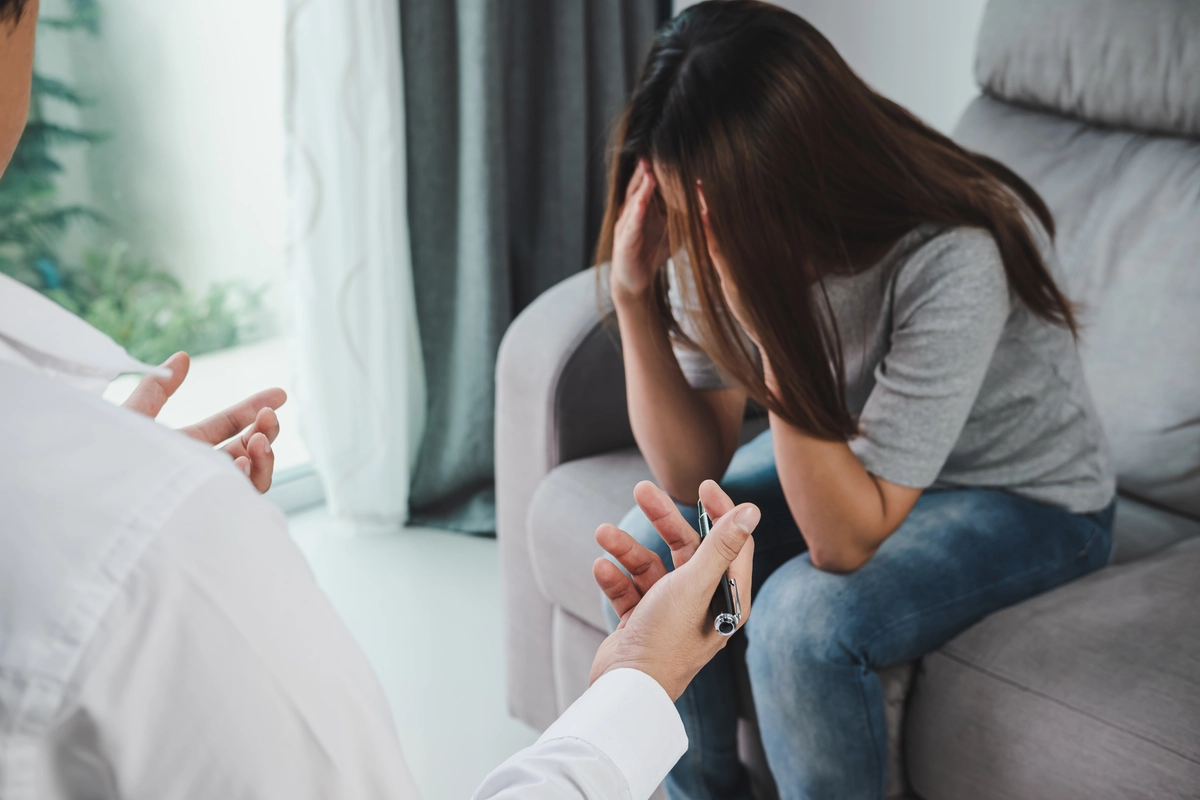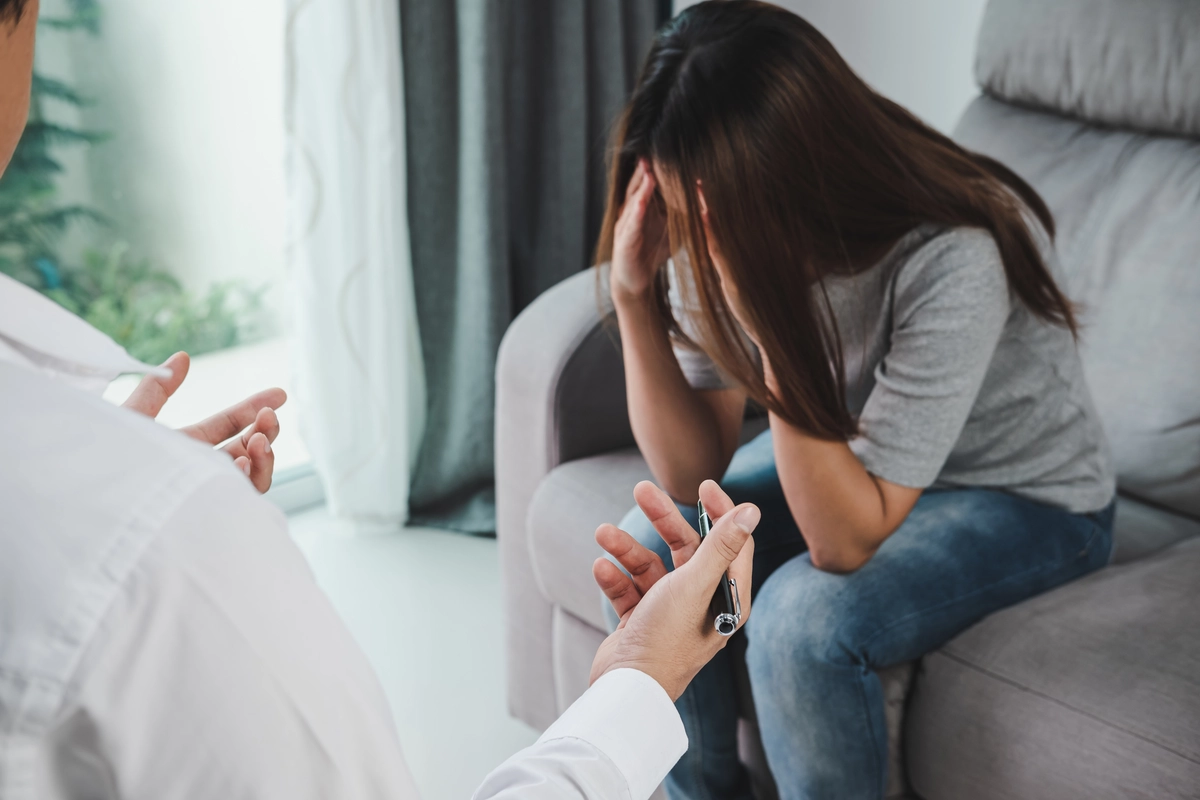24/7 Helpline:
(866) 899-221924/7 Helpline:
(866) 899-2219
Learn more about Bipolar Disorder Treatment centers in Watkins
Bipolar Disorder Treatment in Other Cities

Other Insurance Options

Multiplan

Medical Mutual of Ohio

Health Partners

CareSource

WellCare Health Plans

Sutter

Health Choice

Covered California

Amerigroup

United Health Care

MHNNet Behavioral Health

Health Net

GEHA

PHCS Network

EmblemHealth

Regence

BlueShield

American Behavioral

Private insurance

BHS | Behavioral Health Systems


ARTS – Peer I
Peer 1 is a program at Addiction Research and Treatment Services (ARTS), providing comprehensive men...

Denver Health and Hospital – Outpatient
Denver Health and Hospital – Outpatient is a private rehab located in Denver, Colorado. Denver Healt...

Mile High Behavioral Health
Mile High Behavioral Health is a Colorado corporation that works with individuals, couples and famil...

Choices in Living Counseling Center – Denver Office
Choices in Living Counseling Center – Denver Office is a drug and alcohol rehab located in Denver, C...

Adolescent & Family Counseling
Adolescent & Family Counseling is a private rehab located in Aurora, Colorado. Adolescent & Family C...

Sandstone Care Denver
Sandstone Care Denver is a treatment center for teens and young adults struggling with substance abu...

Denver Health Community Detox and Behavioral Health
Denver Health Community Detox and Behavioral Health is a public rehab located in Denver, Colorado. D...

A Womans Way to Recovery
A Womans Way to Recovery is a private rehab located in Denver, CO. A Womans Way to Recovery speciali...

Action Counseling
Action Counseling offers outpatient treatment for individuals with alcohol and/or substance addictio...

Third Way Center – Lincoln Street
Third Way Center – Lincoln Street is a private rehab located in Denver, Colorado. Third Way Center –...

Hampden Academy – Child and Family Outpatient
Hampden Academy – Child and Family Outpatient is a private rehab located in Aurora, Colorado. Hampde...

Boulder Clinic Denver Behavioral Health
Boulder Clinic Denver Behavioral Health is a private rehab located in Denver, Colorado. Boulder Clin...

The Raleigh House of Hope
Welcome to The Raleigh House! You’ll find us just 15 minutes from Denver in a beautiful, spacious, r...

The Seventh Odyssey
The Seventh Odyssey is a private rehab located in Denver, CO. The Seventh Odyssey specializes in the...

Colorado Mental Health Institute – Fort Logan
Colorado Mental Health Institute – Fort Logan is a public rehab located in Denver, Colorado. Colorad...

ATOPS
ATOPS is located in Denver, Colorado. ATOPS is a premier alcohol and drug treatment agency that offe...

Community Reach Center
Community Reach Center is a private rehab located in Commerce City, Colorado. Community Reach Center...

Servicios de La Raza – The Mental Health Unit
Servicios de La Raza – The Mental Health Unit is a private rehab located in Denver, Colorado. Servic...

Aurora Mental Health Center – Chambers Road
Aurora Mental Health Center–Chambers Road provides mental and behavioral health care for youth and a...

Sisters of Color – SOCUE – Althea Center
Sisters of Color – SOCUE – Althea Center is a non-profit rehab located in Denver, Colorado. Sisters ...

It Takes a Village
It Takes a Village offers a substance abuse treatment program for individuals of color who are HIV p...

Integrity
Integrity is a private rehab located in Denver, Colorado. Integrity specializes in the treatment of ...

Aurora Center for Treatment – Chambers Road
Aurora Center for Treatment - Chambers Road is an outpatient facility that offers treatment for indi...

The Haven
Addiction Research and Treatment Services (ARTS) is a clinical program from the Division of Substanc...

CADREC
CADREC is a private rehab located in Denver, Colorado. CADREC specializes in the treatment of alcoho...

Mental Health Center of Denver – Family Outpatient
Mental Health Center of Denver – Family Outpatient is a private rehab located in Denver, Colorado. M...

Aurora Mental Health Center – Fitzsimons Center
Aurora Mental Health Center – Fitzsimons Center is a private rehab located in Aurora, Colorado. Auro...

Aurora Mental Health Center – Alameda Center
Aurora Mental Health Center offers outpatient mental and behavioral health care for adolescents and ...

ACI Counseling Services
ACI Counseling Services is a private rehab located in Denver, Colorado. ACI Counseling Services spec...

Acacia Counseling
Acacia Counseling is a private rehab located in Denver, CO. Acacia Counseling specializes in the tre...

Turning Point Mental Health Services
Turning Point Mental Health Services is a private traditional rehab located in Denver, CO. Turning P...

Recovering Spirit
Recovering Spirit is a private rehab located in Denver, Colorado. Recovering Spirit specializes in t...

Eagle Counseling Services
Eagle Counseling Services is a private rehab located in Denver, Colorado. Eagle Counseling Services ...

Parker Froyd and Associates – Mental Health
Parker Froyd and Associates – Mental Health is a private rehab located in Aurora, Colorado. Parker F...

Arapahoe House – Outpatient
Arapahoe House – Outpatient is a private rehab located in Aurora, Colorado. Arapahoe House – Outpati...

Correctional Psychology Associates – CPA
Correctional Psychology Associates (CPA) provide outpatient services for substance abuse as well as ...

Savio House
Savio House is a non-profit rehab located in Denver, Colorado. Savio House specializes in the treatm...

National Institute for Change – Aurora
National Institute for Change – Aurora is a private rehab located in Aurora, Colorado. National Inst...

Stout Street Foundation – Serenity
Stout Street Foundation - Serenity is a Non-Profit rehab center located in Commerce City, CO. Stout ...

Step Denver
Step Denver is a non-profit organization offering residential recovery programs for men who have str...

Independence House – North Side
Independence House, located in Denver, Colorado, focuses on treating individuals with behavioral hea...

La Trenza Counseling
La Trenza Counseling is a private rehab located in Commerce City, Colorado. La Trenza Counseling spe...

The Phoenix
The Phoenix’s mission is to build sober active community that fuels resilience and harnesses the tra...

Mental Health Center of Denver – Recovery Center
Mental Health Center of Denver - Recovery Center is a mental health and alcohol and drug rehab cente...

Alcohol and Behavior Information
Alcohol and Behavior Information is a private rehab located in Denver, CO. Alcohol and Behavior Info...

Equinox Counseling and Wellness Center
Equinox Counseling and Wellness is located in Denver, Colorado. They provide mental health services,...

Denver Women’s Recovery
Denver Women's Recovery is a trauma-informed luxurious women's drug and alcohol treatment center tha...

Sobriety House Inc.
Sobriety House Inc. is a drug and alcohol rehab located in Denver, Colorado. They provide addiction ...

Buckingham Psychological Services
Buckingham Psychological Services is a private rehab located in Aurora, Colorado. Buckingham Psychol...

Mental Health Center of Denver – Wellshire Behavioral Services
Mental Health Center of Denver – Wellshire Behavioral Services is a private rehab located in Denver,...

BAART Programs
BAART Programs is a private rehab located in Brighton, Colorado. BAART Programs specializes in the t...

Sandstone Care – Rally Point
Sandstone Care–Rally Point provides supportive housing for recovering adolescent and young adult mal...

Eating Recovery Center
Eating Recovery Center is an eating disorder treatment center that offers eating disorder treatment ...

Mile High Continuing Care
Mile High Continuing Care is a private rehab located in Denver, Colorado. Mile High Continuing Care ...

Golden Peak Recovery
Golden Peak Recovery is an accredited dual diagnosis drug and alcohol rehab center nestled in Denver...

The Coleman Institute
The Coleman Institute is dedicated on providing a rapid detox to help those individuals detoxify fro...

Key to Life Counseling Center
Key to Life Counseling Center offers intensive outpatient treatment for individuals with alcohol and...

Life Continues Recovery of Colorado
Life Continues Recovery of Colorado is a peer support and coaching service in Denver, CO. Life Conti...

Landmark Recovery of Denver
Situated in Aurora, Colorado, Landmark Recovery of Denver is a drug and alcohol treatment center tha...

Mile High Recovery Center
At Mile High Recovery, we work with an individual until they are whole. Our levels of care range fro...

ARTS – Specialized Outpatient Services
ARTS - Specialized Outpatient Services is located in Denver, Colorado. ARTS - Specialized Outpatient...

Continuum Recovery Center of Colorado
Continuum Recovery Center of Colorado is a private rehab located in Denver, Colorado. Continuum Reco...

Independence House – 2425 South Broadway
Independence House - 2425 South Broadway offers outpatient services for individuals with a Mental He...

Saddle Rock Counseling
Saddle Rock Counseling is a private rehab located in Aurora, Colorado. Saddle Rock Counseling specia...

Mile High Behavioral Healthcare
Mile High Behavioral Healthcare provides comprehensive, supportive and empathetic behavioral healthc...

About Change Counseling
About Change Counseling is a non-profit rehab located in Aurora, Illinois. About Change Counseling s...

Hope for Tomorrow
Hope for Tomorrow is a 12-Step drug and alcohol rehab for adult men in Aurora, Illinois. The facilit...

Mercy Medical Center – Behavioral Health
Mercy Medical Center – Behavioral Health is a private rehab located in Aurora, Illinois. Mercy Medic...

Gateway Foundation
Gateway Foundation – Aurora is a drug rehab center helping individuals battling alcohol and drug abu...

Association for Individual Development – Outpatient
Association for Individual Development - Outpatient is an outpatient rehab located in Aurora, IL. As...

Family Guidance Centers – FGC
Family Guidance Centers - FGC is a non-profit behavioral healthcare organization providing treatment...

Tools for Life
Tools for Life is a private rehab located in Aurora, Illinois. Tools for Life specializes in the tre...

Family Counseling Service
Family Counseling Service is a private counseling clinic located in Aurora, IL. Family Counseling Se...

Breaking Free
Breaking Free is a nonprofit mental health and addiction recovery center located in Aurora, Illinois...

Taking Control
Taking Control is a private rehab located in Aurora, Illinois. Taking Control specializes in the tre...

Ascension Brighton Center for Recovery
The Ascension Brighton Center for Recovery in Brighton, MI is a drug and alcohol addiction rehab for...

Key Development Center
Key Development Center is a non-profit substance abuse prevention and treatment located at Brighton,...

Advanced Counseling Services
Advanced Counseling Services is located in Brighton, Michigan. Advanced Counseling Services provides...

Brighton Center
Brighton Center is a private rehab located in Brighton, Michigan. Brighton Center specializes in the...

Revival Recovery Center
Revival Recovery Center is an outpatient medical treatment center for substance abuse and mental hea...

Nancy Lowrie & Associates – NLA
Nancy Lowrie & Associates (NLA) offers treatment for all types of mental and behavioral health conce...



















































Denver Recovery Group
Denver Recovery Group is a drug and alcohol rehab located in Denver, Colorado. They provide outpatie...

Face it Together
Face it Together is a coaching center located in Denver, Colorado. Face it Together specializes in p...

Arapahoe House
Arapahoe House is a private rehab located in Aurora, Colorado. Arapahoe House specializes in the tre...

Timberline Counseling
Timberline Counseling is a private rehab located in Denver, Colorado. Timberline Counseling speciali...

Dry Creek Treatment Center
Dry Creek Treatment Center is a private rehab located in Denver, Colorado. Dry Creek Treatment Cente...

Eagle Lodge Behavioral Health
Eagle Lodge Behavioral Health is a private rehab located in Denver, Colorado. Eagle Lodge Behavioral...

Broader Horizons Counseling Services
Broader Horizons Counseling Services is a private rehab located in Denver, Colorado. Broader Horizon...

Professional Psychology Clinic
Professional Psychology Clinic is a private rehab located in Denver, Colorado. Professional Psycholo...

Multi Services Clinic
Multi Services Clinic is a private rehab located in Denver, Colorado. Multi Services Clinic speciali...

Step-Up
Step-Up, Inc. is a counseling clinic located in Aurora, CO. Step-Up, Inc. specializes in the treatme...

Behavioral Treatment Services
Behavioral Treatment Services is a private rehab located in Denver, Colorado. Behavioral Treatment S...

Alcohol Behavior Information
Alcohol Behavior Information is a private rehab located in Aurora, Colorado. Alcohol Behavior Inform...

Sisters of Color SOCUE – AntiViolence Program
Sisters of Color SOCUE – AntiViolence Program is a non-profit rehab located in Denver, Colorado. Sis...

Action Counseling
Action Counseling offers outpatient treatment for individuals with alcohol and/or substance addictio...

Centerboard Recovery Center
Centerboard Recovery Center offers outpatient treatment for individuals with alcohol and/or substanc...

Criminal Justice Addiction Services
Criminal Justice Addiction Services is a private rehab located in Denver, Colorado. Criminal Justice...

Restoration Counseling Center
Restoration Counseling Center is a private rehab located in Aurora, Colorado. Restoration Counseling...

Attitude Development Services
Attitude Development Services is a private rehab located in Denver, Colorado. Attitude Development S...

Alcohol Outpatient Treatment
Alcohol Outpatient Treatment is a private rehab located in Denver, Colorado. Alcohol Outpatient Trea...

Marijuana Anonymous – MA
Marijuana Anonymous offers outpatient services for men and women who are dealing with a Marijuana Ad...

Mental Health Center of Denver – David House
Mental Health Center of Denver – David House is a private rehab located in Denver, Colorado. Mental ...

Peer Assistance Services
Peer Assistance Services is a non-profit rehab located in Denver, Colorado. Peer Assistance Services...

School of Recovery and Self Improvement
School of Recovery and Self Improvement is a private rehab located in Aurora, Colorado. School of Re...

Mile High Area of Narcotics Anonymous
Mile High Area of Narcotics Anonymous is a non-profit rehab located in Denver, CO. Mile High Area of...

Counseling Downtown
Counseling Downtown is a private rehab located in Denver, Colorado. Counseling Downtown specializes ...

Colorado MOVES
Colorado MOVES is a private rehab located in Denver, Colorado. Colorado MOVES specializes in the tre...

York Street Club
York Street Club is a non-profit rehab located in Denver, Colorado. York Street Club specializes in ...

IDEA
IDEA is a drug and alcohol rehab that supports adults (18+) struggling with addiction. Located in Au...

Alexander Counseling Associates
Alexander Counseling Associates is a private rehab located in Denver, Colorado. Alexander Counseling...

Center for Recovery
Center for Recovery is a drug and alcohol rehab located in Denver, Colorado. They provide addiction ...

Community Partnerships and Associates
Community Partnerships and Associates is an outpatient rehab located in Aurora, CO. Community Partne...

Aspen Treatment Services
Aspen Treatment Services is a public rehab located in Denver, Colorado. Aspen Treatment Services spe...

Clinic for Child and Family Psychology
Clinic for Child and Family Psychology is a private rehab located in Denver, Colorado. Clinic for Ch...

Arapahoe House – Aspen Center
Arapahoe House – Aspen Center is a private rehab located in Denver, Colorado. Arapahoe House – Aspen...

New Journey to Wellness
New Journey to Wellness is a private rehab located in Denver, CO. New Journey to Wellness specialize...

Mental Health Center of Denver – El Centro de Las Familias
Mental Health Center of Denver – El Centro de Las Familias is a private rehab located in Denver, Col...

AA – Alcoholics Anonymous – Denver Area
AA – Alcoholics Anonymous – Denver Area is a non-profit rehab located in Denver, Colorado. AA – Alco...

Colorado Assessment and Treatment Center
Colorado Assessment and Treatment Center is a private rehab located in Denver, Colorado. Colorado As...

Eagle Lodge
Eagle Lodge is a private rehab located in Denver, Colorado. Eagle Lodge specializes in the treatment...

1st Alliance Treatment Services
1st Alliance Treatment Services is located in Brighton, Colorado. 1st Alliance Treatment Services pr...

Aurora Mental Health Center – North Aurora Center
Aurora Mental Health Center – North Aurora Center is a non-profit rehab located in Aurora, Colorado....

Mental Health Center of Denver
Mental Health Center of Denver is a traditional rehab located in Aurora, CO. Mental Health Center of...

Aurora Community Mental Health Center
Aurora Community Mental Health Center is a private rehab located in Aurora, Colorado. Aurora Communi...

Adolescent Counseling Exchange
Adolescent Counseling Exchange is a private rehab located in Denver, Colorado. Adolescent Counseling...

Mental Health Center of Denver – Monroe House
Mental Health Center of Denver – Monroe House is a private rehab located in Denver, Colorado. Mental...

Parker Froyd and Associates – Mental Health
Parker Froyd and Associates – Mental Health is a private rehab located in Denver, Colorado. Parker F...

Empowerment Counseling Services
Empowerment Counseling Services is a private rehab located in Denver, Colorado. Empowerment Counseli...

Genesis Counseling
Genesis Counseling is a private rehab located in Commerce City, Colorado. Genesis Counseling special...

IDEA – North Washington street
IDEA – North Washington street is a private rehab located in Denver, Colorado. IDEA – North Washingt...

Aurora Center for Treatment – South Buckley Road
Aurora Center for Treatment - South Buckley Road is an outpatient facility that offers treatment for...

Third Way Center – Pontiac
Third Way Center – Pontiac is a private rehab located in Denver, Colorado. Third Way Center – Pontia...

Centro de Orientacion la Piramide
Centro de Orientacion la Piramide is a private rehab located in Aurora, Colorado. Centro de Orientac...

Project Step
Project Step is a private rehab located in Denver, Colorado. Project Step specializes in the treatme...

Spectrum Counseling
Spectrum Counseling is a private rehab located in Denver, Colorado. Spectrum Counseling specializes ...

Recovery Miracles – Step Forward
Recovery Miracles – Step Forward is a non-profit rehab located in Denver, Colorado. Recovery Miracle...

Life Recovery Center
Life Recovery Center is a private rehab located in Denver, Colorado. Life Recovery Center specialize...

Bridge Street Counseling
Bridge Street Counseling is a counseling-clinic rehab located in Brighton, CO. Bridge Street Counsel...

Broadway Counseling Services
Broadway Counseling Services is a private rehab located in Denver, Colorado. Broadway Counseling Ser...

Sobriety House – The Phoenix Concept
Sobriety House – The Phoenix Concept is a non-profit rehab located in Denver, Colorado. Sobriety Hou...

Aurora Mental Health Center – Galena Center
Aurora Mental Health Center – Galena Center is a non-profit rehab located in Aurora, Colorado. Auror...

Empowerment Program
Empowerment Program is a counseling clinic located in Denver, CO. Empowerment Program specializes in...

STOPS
STOPS is a private rehab located in Denver, Colorado. STOPS specializes in the treatment of alcoholi...

Peer Assistance
Peer Assistance is a private rehab located in Denver, Colorado. Peer Assistance specializes in the t...

Healing Life’s Pains
Healing Life’s Pains is a private rehab located in Denver, Colorado. Healing Life’s Pains specialize...

Community Resource for Alcohol and Family Treatment
Community Resource for Alcohol and Family Treatment is a private rehab located in Denver, Colorado. ...

Alano Club
Alano Club is a non-profit rehab located in Denver, Colorado. Alano Club specializes in the treatmen...

Advantage Treatment Center
Advantage Treatment Center is a private rehab located in Denver, Colorado. Advantage Treatment Cente...

AA – Alcoholics Anonymous – Aurora Club
AA – Alcoholics Anonymous – Aurora Club is a non-profit rehab located in Aurora, Colorado. AA – Alco...

Independence House
Independence House is a private rehab located in Aurora, Colorado. Independence House specializes in...

1st Alliance Treatment Services
1st Alliance Treatment Services is located in Aurora, Colorado. 1st Alliance Treatment Services prov...

AA – Alcoholics Anonymous – West 32nd Avenue
AA – Alcoholics Anonymous – West 32nd Avenue is a non-profit rehab located in Denver, Colorado. AA –...

Christian 12 Step Education – Relapse Prevention
Christian 12 Step Education – Relapse Prevention is a private rehab located in Aurora, Colorado. Chr...

Community Reach Center – Crestone Place
Community Reach Center – Crestone Place is a private rehab located in Denver, Colorado. Community Re...

Aurora Mental Health Center – Intercept Center
Aurora Mental Health Center – Intercept Center is a non-profit rehab located in Aurora, Colorado. Au...

Health Recovery Centers
Health Recovery Centers is a private rehab located in Denver, Colorado. Health Recovery Centers spec...

1st Alliance Treatment Services – Colorado Boulevard
1st Alliance Treatment Services - Colorado Boulevard is located in Denver, Colorado. 1st Alliance Tr...

Excel Treatment Program
Treatment Centers XL offers detoxification programs along with outpatient and intensive counseling t...

Arapahoe House – Adolescent and Adult Outpatient
Arapahoe House – Adolescent and Adult Outpatient is a private rehab located in Denver, Colorado. Ara...

Al – Anon
Al – Anon is a non-profit rehab located in Denver, Colorado. Al – Anon specializes in the treatment ...

Dimensions in Awareness
Dimensions in Awareness is a private rehab located in Denver, Colorado. Dimensions in Awareness spec...

Chrysalis Counseling
Chrysalis Counseling is a private rehab located in Strasburg, Colorado. Chrysalis Counseling special...

Professional Counseling Services
Professional Counseling Services is a private rehab located in Denver, Colorado. Professional Counse...

Creative Recovery Counseling
Creative Recovery Counseling is a private rehab located in Aurora, Colorado. Creative Recovery Couns...

Saddle Rock Counseling – Xanadu Way
Saddle Rock Counseling is a private counseling clinic located in Aurora, Colorado. Saddle Rock Couns...

Gateway Treatment Center
Gateway Treatment Center is a private rehab located in Denver, Colorado. Gateway Treatment Center sp...

Anderson and Hager Connections
Anderson and Hager Connections is a private rehab located in Denver, Colorado. Anderson and Hager Co...

ARTS – Haven
ARTS – Haven is a Denver, Colorado drug and alcohol rehab that treats adults with substance use diso...

Salvation Army – Adult Rehab Center Alcohol Abuse
Located in Denver, Colorado, Salvation Army – Adult Rehab Center Alcohol Abuse is a drug and alcohol...

Physician Drug Research
Physician Drug Research is a private rehab located in Denver, Colorado. Physician Drug Research spec...

ARTS – Synergy
ARTS - Synergy located in Denver, Colorado. ARTS - Synergy serves adolescents with substance use, co...

IDEA – West 29th Avenue
IDEA – West 29th Avenue is a private rehab located in Denver, Colorado. IDEA – West 29th Avenue spec...

Arapahoe House Commerce City Clinic
Arapahoe House Commerce City Clinic is a private rehab located in Commerce City, Colorado. Arapahoe ...

Community Transitions Program
Community Transitions Program is a private rehab located in Aurora, Colorado. Community Transitions ...

Community Reach Center – Mesa House
Community Reach Center – Mesa House is a private rehab located in Commerce City, Colorado. Community...

University of Colorado Hospital – Psychiatric Outpatient
University of Colorado Hospital – Psychiatric Outpatient is a public rehab located in Aurora, Colora...

Milestone Counseling
Milestone Counseling is a private rehab located in Denver, Colorado. Milestone Counseling specialize...

Choosing Life Center
Choosing Life Center is a private rehab located in Denver, Colorado. Choosing Life Center specialize...

Alcohol Counseling Services of Colorado
Alcohol Counseling Services of Colorado is a private rehab located in Denver, Colorado. Alcohol Coun...

Community Reach Center – Stages
Community Reach Center provides dual diagnosis treatment and alcohol and drug rehab programming to i...

Eagle Counseling Services
Eagle Counseling Services is a private rehab located in Aurora, Colorado. Eagle Counseling Services ...

Transition and Recovery – Counseling
Transition and Recovery - Counseling is a private rehab located in Denver, CO. Transition and Recove...

ARTS – Potomac Street Center
ARTS - Potomac Street Center located in Aurora, Colorado. ARTS - Potomac Street Center offers substa...

Heritage Counseling Center
Heritage Outpatient is a private rehab located in Denver, CO. Heritage Outpatient specializes in the...

AA – Alcoholics Anonymous
AA – Alcoholics Anonymous is a non-profit rehab located in Aurora, Colorado. AA – Alcoholics Anonymo...

Anchor Counseling
Anchor Counseling is a private rehab located in Denver, Colorado. Anchor Counseling specializes in t...

Peaceful Solutions
Peaceful Solutions is a private rehab located in Brighton, Colorado. Peaceful Solutions specializes ...

Arapahoe House
Arapahoe House is a private rehab located in Denver, Colorado. Arapahoe House specializes in the tre...

Axis One Center for Drug and Alcohol Treatment
Axis One Center for Drug and Alcohol Treatment is a private rehab located in Aurora, Colorado. Axis ...

Community Re-Entry Project
Community Re-Entry Project is a public rehab located in Denver, Colorado. Community Re-Entry Project...

Strides
Strides is a private rehab located in Denver, Colorado. Strides specializes in the treatment of alco...

Peoria Treatment Center
Peoria Treatment Center is a private rehab located in Aurora, Colorado. Peoria Treatment Center spec...

Hazelden Betty Ford
Betty Ford Center Children's Program helps kids ages 7-12 who grow up in families hurt by addiction....

IDEA – Alameda Avenue
IDEA – Alameda Avenue is a private rehab located in Aurora, Colorado. IDEA – Alameda Avenue speciali...

Multi Addictions Processing Agency – MAPA
Multi Addictions Processing Agency – MAPA is a private rehab located in Denver, Colorado. Multi Addi...

CHANCE
CHANCE is a private rehab located in Aurora, Colorado. CHANCE specializes in the treatment of alcoho...

Front Range Counseling Center
Front Range Counseling Center (FRCC) is a family-oriented facility in Denver, Colorado offering care...

Abusive Men Exploring New Directions
Abusive Men Exploring New Directions is a private rehab located in Denver, Colorado. Abusive Men Exp...

Behavioral Alternatives Center – Aurora
Behavioral Alternatives Center – Aurora is a private rehab located in Aurora, Colorado. Behavioral A...

Horizon Counseling
Horizon Counseling is a private rehab located in Denver, Colorado. Horizon Counseling specializes in...

CPR Rehabilitation Therapy
CPR Rehabilitation Therapy is a private rehab located in Denver, Colorado. CPR Rehabilitation Therap...

National Substance Abuse
National Substance Abuse is a private rehab located in Denver, Colorado. National Substance Abuse sp...

1st Alliance Treatment Services – Sherman Street
1st Alliance Treatment Services - Sherman Street is located in Denver, Colorado. 1st Alliance Treatm...

AA – Alcoholics Anonymous – West Evans Avenue
AA – Alcoholics Anonymous – West Evans Avenue is a non-profit rehab located in Denver, Colorado. AA ...

Essex Growth Center
Essex Growth Center is a private rehab located in Denver, Colorado. Essex Growth Center specializes ...

ARTS – Innovative Recovery Clinic
ARTS - Innovative Recovery Clinic is located in Denver, Colorado. ARTS - Innovative Recovery Clinic ...

Milestone Counseling
Milestone Counseling is a private rehab located in Aurora, Colorado. Milestone Counseling specialize...

Our Inheritance
Our Inheritance is a private rehab located in Aurora, CO. Our Inheritance specializes in the treatme...

NorthStar Transitions
NorthStar Transitions offers extended care substance abuse treatment to young adult men and women 18...

Project ReNew
Project ReNew is a public rehab located in Denver, Colorado. Project ReNew specializes in the treatm...

BI Day Reporting Center
BI Day Reporting Center is a private rehab located in Denver, Colorado. BI Day Reporting Center spec...

AA – Alcoholics Anonymous – Little Red House
AA – Alcoholics Anonymous – Little Red House is a non-profit rehab located in Commerce City, Colorad...

Fellowship Club
Fellowship Club is a non-profit rehab located in Aurora, Colorado. Fellowship Club specializes in th...

Bicycle Health – Colorado
Bicycle Health - Colorado is an online Medication Assisted Treatment Program. Bicycle Health - Color...

A and D Counseling Aurora
A and D Counseling Aurora is a private rehab located in Aurora, Colorado. A and D Counseling Aurora ...

Diversity Counseling and Education Center
Diversity Counseling and Education Center is a private rehab located in Denver, CO. Diversity Counse...

Mental Health Center of Denver
Mental Health Center of Denver is a private rehab located in Denver, Colorado. Mental Health Center ...

Anchor Counseling
Anchor Counseling is a private rehab located in Aurora, Colorado. Anchor Counseling specializes in t...

The Boulder Clinic – Behavioral Health Center
The Boulder Clinic – Behavioral Health Center is a private rehab located in Denver, Colorado. The Bo...

Third Way Center – East Lowry Boulevard
Third Way Center – East Lowry Boulevard is a private rehab located in Denver, Colorado. Third Way Ce...

Sobriety House – Stepping Stone
Sobriety House - Stepping Stone is a non-profit rehab located in Denver, CO. Sobriety House - Steppi...

Transitional Alternative – Reentry Initiative
Transitional Alternative – Reentry Initiative is a private rehab located in Aurora, Illinois. Transi...

Opportunity House
Opportunity House is a non-profit rehab located in Aurora, Illinois. Opportunity House specializes i...

Association for Individual Development – Behavioral Health Outpatient
Association for Individual Development – Behavioral Health Outpatient is a private rehab located in ...

Genesis Therapy Center
Genesis Therapy Center is a private rehab located in Aurora, Illinois. Genesis Therapy Center specia...

Association for Individual Development – Behavioral Health Supervised Living
Association for Individual Development – Behavioral Health Supervised Living is a private rehab loca...

RITAS Ministry
RITAS Ministry is a rehab located in Aurora, IL. RITAS Ministry is a faith-based offender re-entry o...

Groups
Groups is private healthcare company providing outpatient treatment for opiate addiction using weekl...

Ann Arbor Consultation Services
Ann Arbor Consultation Services is a private rehab located in Brighton, Michigan. Ann Arbor Consulta...

Saint Joseph Mercy – Outpatient Behavioral Services
Saint Joseph Mercy – Outpatient Behavioral Services is a private rehab located in Brighton, Michigan...

Livingston Alano Club
Livingston Alano Club is a non-profit rehab located in Brighton, Michigan. Livingston Alano Club spe...

Breaking The Chain Counseling Center
Breaking The Chain Counseling Center is a private organization located in Brighton, Michigan. Breaki...

Alliance Counseling Associates
Alliance Counseling Associates is a private counseling clinic located in Aurora, Missouri. Alliance ...

Jacob’s Ladder
Jacob’s Ladder is a long term residential recovery center for young men located in Aurora, West Virg...

































































